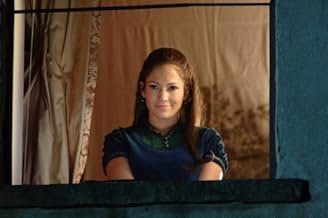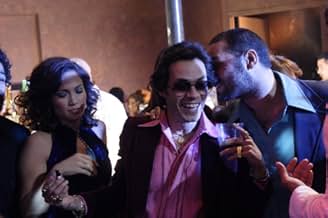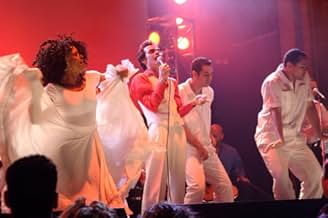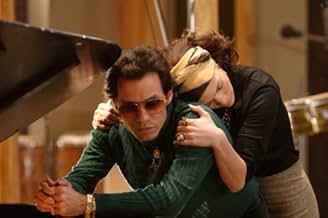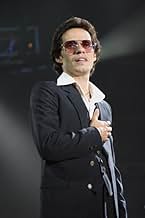AVALIAÇÃO DA IMDb
5,5/10
5,4 mil
SUA AVALIAÇÃO
Adicionar um enredo no seu idiomaThe life story of Hector Lavoe, who started the salsa movement in 1975 and brought it to the United States.The life story of Hector Lavoe, who started the salsa movement in 1975 and brought it to the United States.The life story of Hector Lavoe, who started the salsa movement in 1975 and brought it to the United States.
- Direção
- Roteiristas
- Artistas
- Prêmios
- 1 vitória no total
Antone Pagán
- Papo
- (as Antone Pagan)
Avaliações em destaque
I couldn't wait to see this movie, however, it was a little disappointing because of the jumpy and sloppy editing. Marc Anthony was great as Hector Lavoe, and Jennifer Lopez was equally as good as Puchi. I went to almost all the venues that Hector played in, including the Palladium, which was the place to go. I saw them all, from Tito Rodriguez, Pacheco, Kako and Tito Puente, etc. However, Hector had this easy style of singing and held you until he was finished. One point I would like to make, Marc Anthony at the present time is the king of Salsa. He can fill a stadium like no other. Hector Lavoe unfortunately was too involved in drugs from the onset...this was part of the musician's scene at the time. Drugs were prevalent, and he made it a part of his life. Anyone who was raised in New York, the City and the Bronx understands that the drugs consumed most musicians. Hector could have been the biggest personality ever, but he blew that gig, sorry to say. I liked the movie, but was not crazy about it. As another writer noted, the character could have been developed a bit more then it was. It was worth the price of admission just to hear all the great music.
This is a biopic of salsa singer Héctor Lavoe (Marc Anthony) who lived from 1946 to 1993. His wife Puchi (Jennifer Lopez) recalls their lives together in 2002. Héctor arrives in NYC from Ponce, Puerto Rico in the early 60s. He quickly gets some success. He meets Puchi who comes from a family of drug dealers. He slowly falls into the world of drugs as his live falls apart.
Marc Anthony's performance comes alive whenever he's singing. He's only competent as an actor but at times, he's overwhelmed by the bigger personality of JLo. There isn't anything original in this biopic story. What's truly lacking is a good cinematic style. This is shot with a style more fitting to a good TV movie. It has way too many montages and the style lacks intensity. The music is great but this can't be just a concert movie.
Marc Anthony's performance comes alive whenever he's singing. He's only competent as an actor but at times, he's overwhelmed by the bigger personality of JLo. There isn't anything original in this biopic story. What's truly lacking is a good cinematic style. This is shot with a style more fitting to a good TV movie. It has way too many montages and the style lacks intensity. The music is great but this can't be just a concert movie.
In 1963, Hector Perez was already a promising young singer in his native Puerto Rico when, at the age of seventeen, he moved to New York City to try and make a name for himself as a performer there. In no time flat, he was playing in clubs, had signed a lucrative recording contract with the Latin-flavored Fania Records, and had changed his name to the far more exotic-sounding Hector Lavoe. From the mid-1960s to his death from AIDS in 1993, Lavoe was an international sensation who helped to popularize the musical style known as "Salsa." But, as with most artists, he lived a life of self-destructive self-indulgence, marked by serial philandering and hardcore drug abuse. He also had a volatile relationship with "Puchi," the Bronx girl who became his wife and who narrates "El Cantante," the glossy movie about his life.
Despite the novelty of the milieu and an undeniable sincerity on the part of everyone involved in its production, "El Cantante" remains doggedly conventional, lackluster and superficial in its treatment of the kind of material with which we are all too familiar from previous biopics that have chronicled the rise and fall of artists of all categories and stripes. Marc Antony brings a certain ferocity and depth to his portrayal of the struggling celebrity, but real-life wife Jennifer Lopez is all fluttery overacting as the woman who stood by her man through good times and bad (mostly bad). The music is enjoyable, but I'm afraid we've all been down this road so many times before that "El Cantante" fails to stir either our passions or our sympathy for the sadly benighted couple and all that they're going through. You'd be better off buying the albums instead.
Despite the novelty of the milieu and an undeniable sincerity on the part of everyone involved in its production, "El Cantante" remains doggedly conventional, lackluster and superficial in its treatment of the kind of material with which we are all too familiar from previous biopics that have chronicled the rise and fall of artists of all categories and stripes. Marc Antony brings a certain ferocity and depth to his portrayal of the struggling celebrity, but real-life wife Jennifer Lopez is all fluttery overacting as the woman who stood by her man through good times and bad (mostly bad). The music is enjoyable, but I'm afraid we've all been down this road so many times before that "El Cantante" fails to stir either our passions or our sympathy for the sadly benighted couple and all that they're going through. You'd be better off buying the albums instead.
First of all, this film is not as bad as people are saying it is. Jennifer Lopez is good and Mark Anthony is great. The music alone is worth your money. That, however, is where the praise must end.
Unfortunately, the script seems sloppy. There's no structure to the story, and the film fails for it. Moments that should be important seem to occur too quickly to feel because the screenwriter(s) seems to lack a sense of pace.
This could have been helped by a good director. Unfortunately, again, the director was one of the screenwriters, which of course didn't bode well for his sense of pacing. The film is jarringly disconnected and the characters, even Lavoe himself, are far less developed than they should be.
Had a film like "Ray" never been released, "El Cantante" would have met every expectation of the public. Unfortunately for the filmmakers of "El Cantante", "Ray" provided a structured script that developed the lead as well as the supporters. "El Cantante" seems to half-develop Puchi and Lavoe, and give really no more than minimal screen time to any supporting cast.
Which leads to probably the biggest problem of all. This film is told through the eyes of Puchi, Hector's wife. While this should provide an insight to who Hector was as a person, it's a very slanted account and the average moviegoer can tell that important things have been left out. This isn't like "Ray", where Ray Charles himself was giving the story and therefore could tell things how they were. Puchi (and subsequently the film) only seems to mention the other women in Hector's life in passing, focuses very little on the tours that Hector undoubtedly went on without her, and really doesn't let us into the world of the entertainment business in the 60's and 70's. Some of this, I'm sure, is because Puchi just didn't know about these things. Some of it too, I suspect, is because she didn't want it in the movie.
This problem would have been rectified if the film was about Puchi with Hector as a supporting character, and if consequently Puchi had been developed to her fullest capabilities. That did not happen.
One has to wonder if some of the reason for the lack of character development and pacing is because they caught wind of the other Lavoe film "The Singer" and tried to rush to beat it to the theaters.
In the end, this film is worth the watch. Is it a classic? No. Is it a good time? Absolutely. There may be another, better Lavoe movie released in our lifetimes. Right now, this film is worth it.
The Script gets a "D". The Director gets a "B", if for no other reason than amazing musical scenes. The Actors get an "A".
Therefore, I give the film a solid B+.
Unfortunately, the script seems sloppy. There's no structure to the story, and the film fails for it. Moments that should be important seem to occur too quickly to feel because the screenwriter(s) seems to lack a sense of pace.
This could have been helped by a good director. Unfortunately, again, the director was one of the screenwriters, which of course didn't bode well for his sense of pacing. The film is jarringly disconnected and the characters, even Lavoe himself, are far less developed than they should be.
Had a film like "Ray" never been released, "El Cantante" would have met every expectation of the public. Unfortunately for the filmmakers of "El Cantante", "Ray" provided a structured script that developed the lead as well as the supporters. "El Cantante" seems to half-develop Puchi and Lavoe, and give really no more than minimal screen time to any supporting cast.
Which leads to probably the biggest problem of all. This film is told through the eyes of Puchi, Hector's wife. While this should provide an insight to who Hector was as a person, it's a very slanted account and the average moviegoer can tell that important things have been left out. This isn't like "Ray", where Ray Charles himself was giving the story and therefore could tell things how they were. Puchi (and subsequently the film) only seems to mention the other women in Hector's life in passing, focuses very little on the tours that Hector undoubtedly went on without her, and really doesn't let us into the world of the entertainment business in the 60's and 70's. Some of this, I'm sure, is because Puchi just didn't know about these things. Some of it too, I suspect, is because she didn't want it in the movie.
This problem would have been rectified if the film was about Puchi with Hector as a supporting character, and if consequently Puchi had been developed to her fullest capabilities. That did not happen.
One has to wonder if some of the reason for the lack of character development and pacing is because they caught wind of the other Lavoe film "The Singer" and tried to rush to beat it to the theaters.
In the end, this film is worth the watch. Is it a classic? No. Is it a good time? Absolutely. There may be another, better Lavoe movie released in our lifetimes. Right now, this film is worth it.
The Script gets a "D". The Director gets a "B", if for no other reason than amazing musical scenes. The Actors get an "A".
Therefore, I give the film a solid B+.
I am a massive Lavoe fan. Ever since I heard the Cosa Nuestra album with Willie. From then I made it a point to look for every bit of music he ever did. So for me this was my most anticipated movie of the year.
The good news about this film is that Jennifer and Marc do a great job of acting. Marc in particular is quite brilliant as Hector. Even his singing is decent (but of course he can't touch Hector). The cinematography is good too. Love the visuals, they've given the movie a 70's look to it which I really dug, made it more authentic. Also, every time there is a stage and the band is playing is amazing. Also, the other casting is superb - Willie Colon, Ralph Mercado, Jerry Massucci were all perfectly cast.
Bad news... it is historically inaccurate, the music is all over the place, you would think it would follow some sort of chronology. There is too much Pucchi, I know the story is told through Pucchi's eyes but it takes away from the Hector story and it means that there is too much Jennifer in it. There are parts where you see Anthony performing a killer Hector track with the band and the focus should be just Hector but the director just has to show Lopez... it doesn't work and it's overkill.
But, I think the biggest problem will be a problem mainly for non salsa listening people (and that includes latinos). I've been reading a lot of reviews by non-latinos and they just don't get why Hector was big. They don't get it because they didn't grow up with salsa and they have no history behind it. The movie is very matter-of-fact that Hector is a legend and for someone who doesn't listen to 70's salsa or wasn't brought up with it they aren't going to understand that. In salsafied countries like Colombia, Peru, Puerto Rico, Panama, etc it won't matter because Hector is a legend. But in Australia, Britain, Europe, Chile, Argentina, Brazil, China, and non-Latin US (basically any country without a history of listening to salsa) forget it. It will matter big! So I have to agree, that's what Ray did really well... explain why Ray was big and that's why it translated even in non-English countries.
Also, I think the opportunity was missed to go into a bigger story of the salsa revolution in the 70's. This music sold millions and it sold all over Latin America and even West Africa where countries were known to be fanatical about (even though they didn't understand Spanish!). To this day it's legacy is still felt, if you go to Callao in Peru, Hector's image has been painted on walls there, go to Cali in Colombia and the people worship him, etc.
I also have to agree there was way too much on the drugs, and Hector's legacy, fame, and legend were not because he took drugs, it was because the music, lyrics and his persona touched people. He was tortured but he must have been happy at times too.
My wife and I are both Hector fans (though i am the fanatic) and we both enjoyed the movie, we will actually buy the DVD when it comes out. It could've been better though.
The good news about this film is that Jennifer and Marc do a great job of acting. Marc in particular is quite brilliant as Hector. Even his singing is decent (but of course he can't touch Hector). The cinematography is good too. Love the visuals, they've given the movie a 70's look to it which I really dug, made it more authentic. Also, every time there is a stage and the band is playing is amazing. Also, the other casting is superb - Willie Colon, Ralph Mercado, Jerry Massucci were all perfectly cast.
Bad news... it is historically inaccurate, the music is all over the place, you would think it would follow some sort of chronology. There is too much Pucchi, I know the story is told through Pucchi's eyes but it takes away from the Hector story and it means that there is too much Jennifer in it. There are parts where you see Anthony performing a killer Hector track with the band and the focus should be just Hector but the director just has to show Lopez... it doesn't work and it's overkill.
But, I think the biggest problem will be a problem mainly for non salsa listening people (and that includes latinos). I've been reading a lot of reviews by non-latinos and they just don't get why Hector was big. They don't get it because they didn't grow up with salsa and they have no history behind it. The movie is very matter-of-fact that Hector is a legend and for someone who doesn't listen to 70's salsa or wasn't brought up with it they aren't going to understand that. In salsafied countries like Colombia, Peru, Puerto Rico, Panama, etc it won't matter because Hector is a legend. But in Australia, Britain, Europe, Chile, Argentina, Brazil, China, and non-Latin US (basically any country without a history of listening to salsa) forget it. It will matter big! So I have to agree, that's what Ray did really well... explain why Ray was big and that's why it translated even in non-English countries.
Also, I think the opportunity was missed to go into a bigger story of the salsa revolution in the 70's. This music sold millions and it sold all over Latin America and even West Africa where countries were known to be fanatical about (even though they didn't understand Spanish!). To this day it's legacy is still felt, if you go to Callao in Peru, Hector's image has been painted on walls there, go to Cali in Colombia and the people worship him, etc.
I also have to agree there was way too much on the drugs, and Hector's legacy, fame, and legend were not because he took drugs, it was because the music, lyrics and his persona touched people. He was tortured but he must have been happy at times too.
My wife and I are both Hector fans (though i am the fanatic) and we both enjoyed the movie, we will actually buy the DVD when it comes out. It could've been better though.
Você sabia?
- CuriosidadesIn a 2016 discussion with SAG-AFTRA, Jennifer Lopez cited "El Cantante" as the film she is most proud of in her career.
- Erros de gravaçãoIn the scene where Hector Perez signs his contract with Jerry Masucci and is given the name Hector Lavoe. Willie Colon is standing behind him. On the wall behind Willie is a framed album cover of "The Hustler", the second album they made together. At this point in the story they have not yet recorded together.
- Citações
Hector Lavoe: I love you.
Puchi: You always love me when you're high.
- ConexõesFeatured in HBO First Look: The Making of 'El Cantante' (2007)
- Trilhas sonorasIt's Time for Christmas Crooner
Written by Stephen Edwards
Performed by Michael Dees
Published by Engine Co 35 (ASCAP) & Source in Sync Music (ASCAP)
Courtesy of 5 Alarm Music
Principais escolhas
Faça login para avaliar e ver a lista de recomendações personalizadas
- How long is El cantante?Fornecido pela Alexa
Detalhes
- Data de lançamento
- País de origem
- Centrais de atendimento oficiais
- Idiomas
- Também conhecido como
- El cantante
- Locações de filme
- Empresas de produção
- Consulte mais créditos da empresa na IMDbPro
Bilheteria
- Faturamento bruto nos EUA e Canadá
- US$ 7.556.712
- Fim de semana de estreia nos EUA e Canadá
- US$ 3.202.035
- 5 de ago. de 2007
- Faturamento bruto mundial
- US$ 8.057.636
- Tempo de duração
- 1 h 46 min(106 min)
- Cor
- Mixagem de som
- Proporção
- 1.85 : 1
Contribua para esta página
Sugerir uma alteração ou adicionar conteúdo ausente








